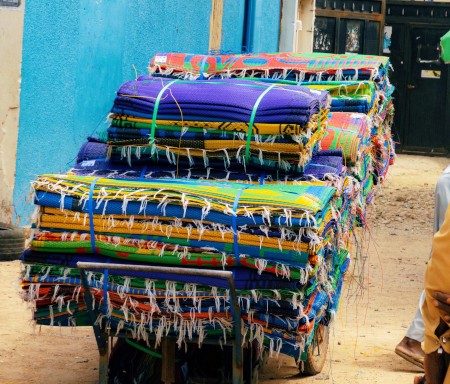
From Chad a shipment of treasures sewn by ‘queens’
On People and Mission online, the story of a project of the Franciscan Alcantarine sisters in a village in Chad
(by Chiara Pellicci)
The most colorful fruits of the mission of the Franciscan Alcantarine sisters present in Bodo, an African village in southern Chad, traveled in a suitcase on the wings of solidarity.
This luggage has been filled with handcrafted bags, made from pagne, those African fabrics with inimitable colors.
They are one-of-a-kind pieces sewn by Paterne, Brigitte, Priscilla, Janette, Eliane, Rosine, Natalie, Chanceline and Hervette, the seamstresses of the workshop-atelier that Sister Paola Letizia Pieraccioni opened in Bodo to produce African fashion accessories.
“They are my nembadje,” says the missionary, ‘that is, ’queens’ in the local language: they are queens because of their poise, their innate elegance, the clothes they wear, the colorful headdresses, the taste they show.
Yet every morning they come out of their huts built with dried earth, straw, cow dung, only sometimes a sheet metal for a roof.
Yet, in Chad’s rural society, women are submissive, not considered equal to men, often abused even in the family.
But they continue to remain “queens,” like all Chadian women.
Perhaps because they are the pillars of the family and the village.”
It was on the head of one of them that the suitcase full of handcrafted bags, ready to be transported to Italy, began its journey: on foot from the atelier to the market, then on a motorcycle-taxi for 60 kilometers of mud and puddles, “the only vehicle capable of crossing the roads in this rainy season,” Sister Pieraccioni recounts.
Then the suitcase was handed over to the driver of a bus, thanks to which after a day’s journey it arrived in Ndjamena, the Chadian capital.
Here a couple of the missionary’s friends picked it up and handed it over to a French gentleman who, having discovered Atelier Bodo, became involved in the solidarity project and made himself available to get it to Paris.
“After 24 hours, a courier arranged by a friend of mine from Prato,” Sister Pieraccioni continued, ”picked up the Parisian suitcase and took it to Turin, where the head of the non-profit organization Il Giardino di Titta, whose benefactors collaborate with us Alcantarine Sisters, was waiting for the bags for next Christmas.
This incredible journey has flown on the wings of solidarity, but it has been set in motion for a very ambitious goal: to defeat the alcoholism that grips local society, a phenomenon in which women play a central role because they are the ones who produce bilibili, an alcoholic beverage made from fermented millet that is consumed by the gallon and empties the granaries of a valuable food for the local economy.
After all, for women this is one of the few jobs that allows them to earn that something essential for family expenses.
But how to convince them to stop producing bilibili?
Atelier Bodo was Sister Paola Letizia’s answer and attempt to pull the plug on the phenomenon of alcoholism by offering women an alternative earning option.
And so the missionary, supported by her congregation, set out to challenge fragility: the journey is a long one, especially since the bags and other tailoring artifacts (such as backpacks, bread baskets, beauty cases, napkin rings, as well as necklaces, earrings, and fashion accessories) are looking for buyers and a marketing channel in Italy.
But the journey on the wings of solidarity has now begun and will not stop.
(Chiara Pellicci, Popoli e Missione online, Oct. 20, 2023)
